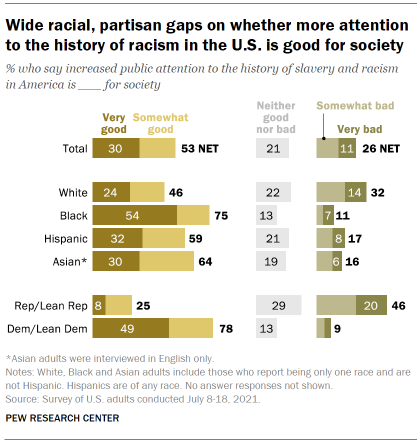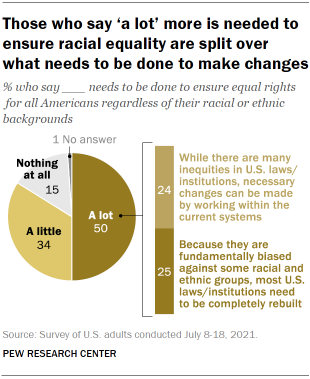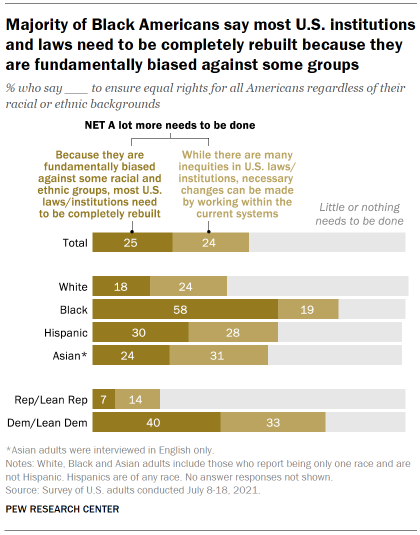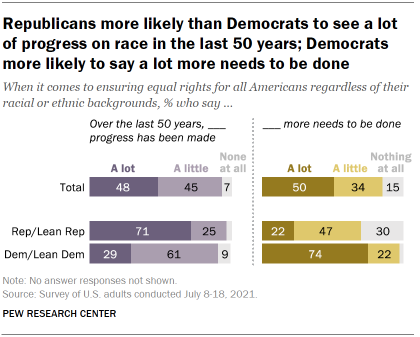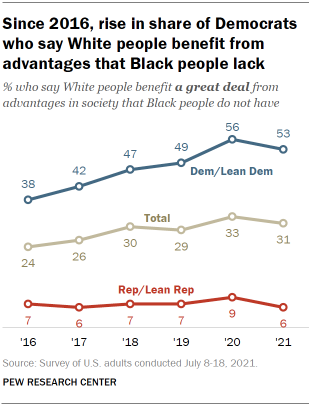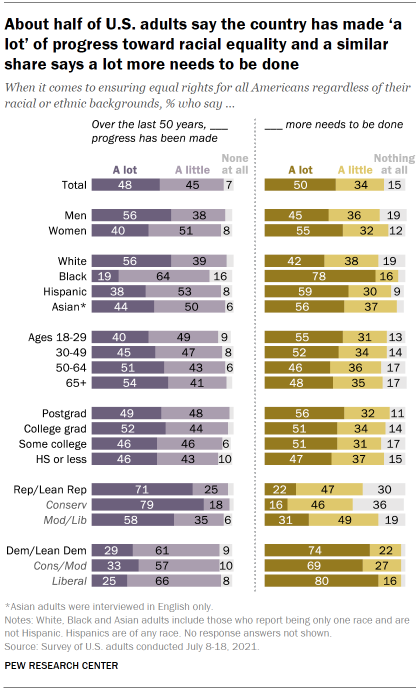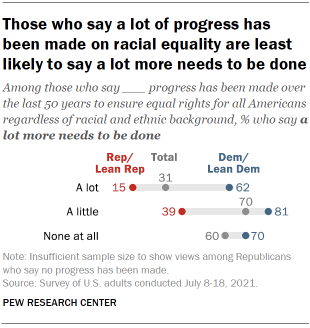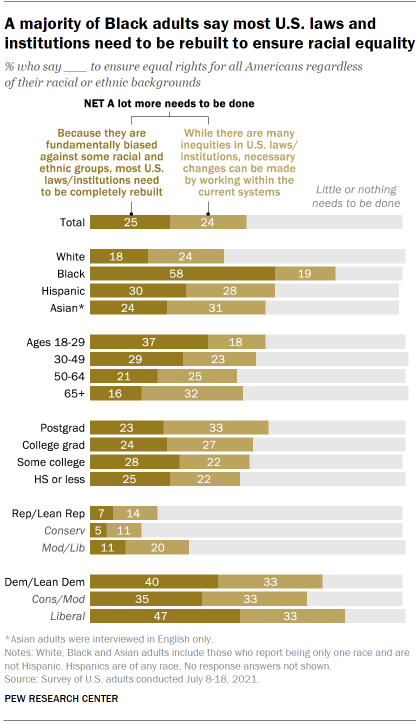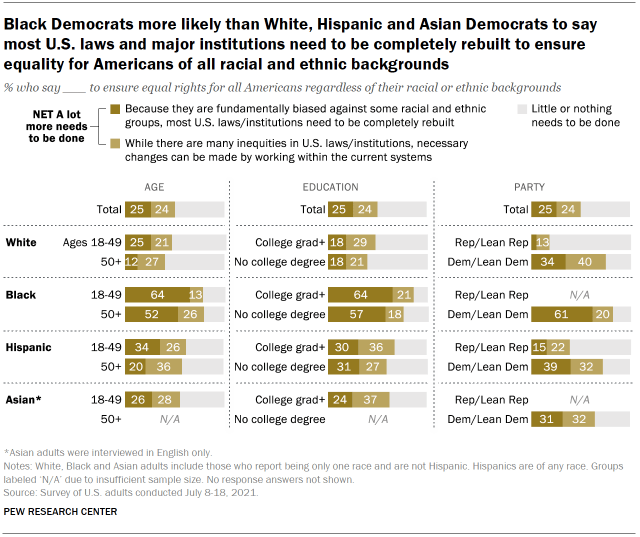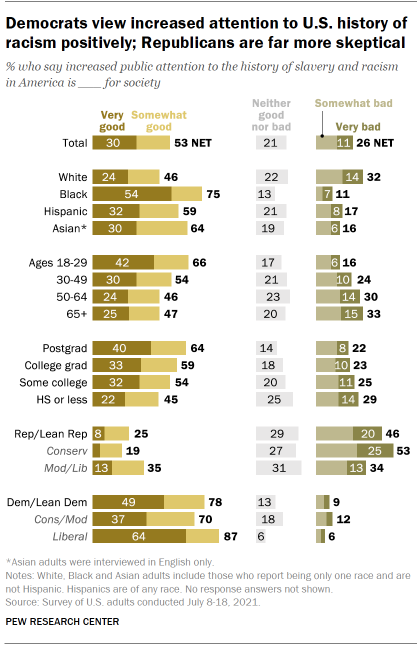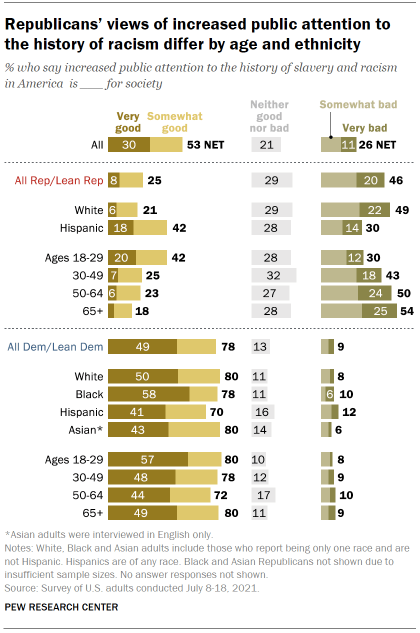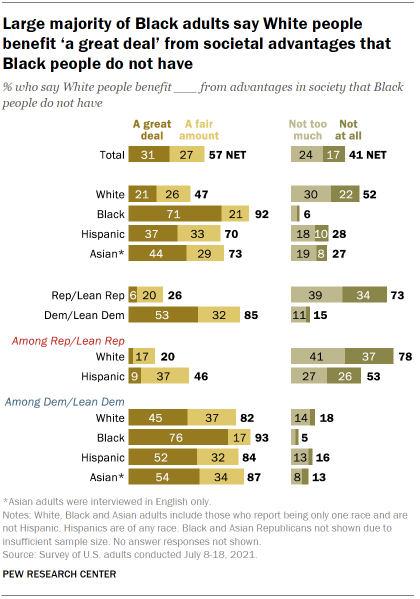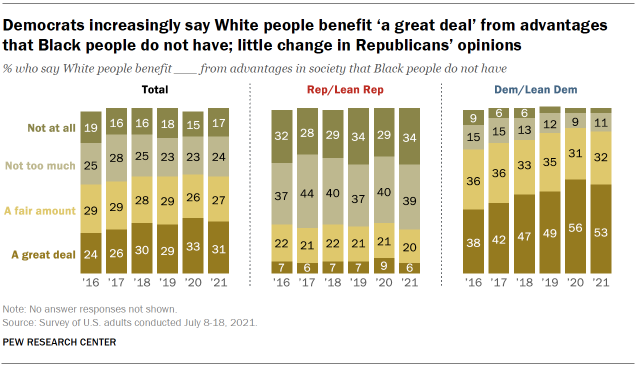Republicans are far more likely than Democrats to say increased attention to history of slavery and racism is bad for the country
Pew Research Center conducted this study to understand how the American public views the country’s progress toward ensuring equal rights for all Americans, regardless of their racial or ethnic background. For this analysis, we surveyed 10,221 U.S. adults in July 2021. Everyone who took part in this survey is a member of the Center’s American Trends Panel (ATP), an online survey panel that is recruited through national, random sampling of residential addresses. This way nearly all U.S. adults have a chance of selection. The survey is weighted to be representative of the U.S. adult population by gender, race, ethnicity, partisan affiliation, education and other categories. Read more about the ATP’s methodology.
Here are the questions used for the report, along with responses, and its methodology.
A little more than a year after nationwide protests erupted after George Floyd’s murder at the hands of the Minneapolis police, the public is deeply divided over how far the nation has progressed in addressing racial inequality – and how much further it needs to go.
Opinion on the current national reckoning over the history of slavery and racism in the United States casts these divisions into stark relief: Among U.S. adults overall, 53% say increased attention to that history is a good thing for society, while 26% say it is a bad thing and another 21% say it is neither good nor bad.
Among Black adults, 75% say heightened public attention to this topic is a good thing, with 54% saying it is “very good” for society. Majorities of Asian American (64%) and Hispanic (59%) adults also view this positively, though much smaller shares say it is a very good thing, compared with Black adults. Among White adults, however, fewer than half (46%) say greater attention to the history of slavery and racism in the U.S. is good for society, with just 24% saying it is very good – about a third (32%) say it is bad.
The partisan divide in these opinions is even wider: Just 25% of Republicans and Republican-leaning independents say greater attention to the history of slavery and racism is a good thing; far more (46%) view it negatively, while 29% see it as neither good nor bad. Democrats and Democratic leaners – across racial and ethnic groups – express overwhelmingly positive views of increased attention to the topic (78% say it is good for society).
The latest national survey by Pew Research Center, conducted July 8-18 among 10,221 adults, finds sizable differences between parties – as well as differences within parties – over how to ensure equal rights for all Americans, regardless of their racial or ethnic backgrounds.
Half of all adults say “a lot” more needs to be done to ensure equal rights for all Americans regardless of their race or ethnicity, while about as many say either that a little (34%) or nothing at all (15%) needs to be done.
The half of Americans who say a lot more needs to be done to ensure equal rights are split over how this can be achieved. About a quarter of the public (24%) says that while there are many inequities in U.S. laws and institutions, necessary changes can be made by working within the current systems, while roughly as many (25%) say that most laws and major institutions need to be completely rebuilt because they are fundamentally biased against some racial and ethnic groups.
Nearly eight-in-ten Black adults say a lot more needs to be done to ensure equal rights for Americans of all racial and ethnic backgrounds. This includes 58% who say that in order to achieve this goal, most of the nation’s laws and major institutions need to be completely rebuilt because they are fundamentally biased and 19% who say needed changes can be made by working in the current systems.
Smaller majorities of Hispanic (59%) and Asian American (56%) adults say a lot more needs to be done to achieve racial equality; just 30% of Hispanics and 24% of Asian Americans say laws and institutions are fundamentally biased and need to be completely rebuilt.
Among White adults, 42% say a lot more needs to be done to ensure racial equality: 18% say most laws and institutions need to be completely rebuilt, while 24% say necessary changes can be made within the current systems.
Republicans overwhelmingly think only a little (47%) or nothing (30%) needs to be done to ensure equal rights for all Americans, regardless of their racial or ethnic backgrounds. Just 22% say a lot more needs to be done, with only 7% saying that most major institutions need to be rebuilt because they are fundamentally biased.
Democrats, by contrast, generally agree that a lot more needs to be done to achieve racial equality (74% say this). Yet Democrats are divided over whether this will require rebuilding most laws and institutions (40%) or can be achieved working through existing systems (33%).
Many of the partisan and racial differences on how much still needs to be done to address racial inequities in this country stem from divergent opinions on how much has been achieved: Republicans are much more likely than Democrats to say the nation has made a lot of progress toward racial equality over the past half-century.
About seven-in-ten Republicans (71%) say the U.S. has made a lot of progress over the last 50 years in ensuring equal rights for all Americans, regardless of their racial or ethnic backgrounds, while just 29% of Democrats say this. A 61% majority of Democrats say a little progress has been made to ensure equality among Americans of all racial and ethnic backgrounds.
These views are almost the reverse of opinions about whether more needs to be done to bring about racial equality; more than three times as many Democrats (74%) as Republicans (22%) say a lot more needs to be done.
Black adults are broadly skeptical about the progress the U.S. has made on this issue over the past 50 years. Only 19% say the country has made a lot of progress, while 64% say it has made a little and 16% say the country has made no progress at all. A majority of White adults (56%) say the U.S. has made a lot of progress on racial equality in this period, as do smaller shares of Asian American (44%) and Hispanic adults (38%).
The survey finds little change in the past year in opinions about whether White people benefit from advantages that Black people do not have. But there has been an increase since 2016, especially among Democrats, in the share saying White people benefit a great deal because of their race.
Overall, 31% of the public says White people benefit a great deal from societal advantages that Black people do not have; 27% say they benefit a fair amount, while 40% think White people derive little or no benefit from advantages that Black people lack.
A 53% majority of Democrats say White people benefit from advantages in society that Black people do not have. While that is little changed in the past year, the share of Democrats expressing this view has increased 15 percentage points since 2016 (from 38% to 53%).
There has been very little change in Republicans’ views over the past five years: Just 6% of Republicans now say White people benefit from advantages that Black people do not have. Nearly three-quarters of Republicans (73%) say White people get little benefit (39%) or no benefit at all (34%) from advantages that Black people do not have.
Public sees progress ensuring equal rights for all Americans regardless of racial or ethnic background – also says more needs to be done
Reflecting back over the last 50 years, more than nine-in-ten Americans say the country has made progress toward “ensuring equal rights for all Americans regardless of their racial or ethnic backgrounds” – about half of the public (48%) says a lot of progress has been made, while nearly as many (45%) say a little progress has been made. Only 7% say the country has not made any progress toward racial equality.
However, while many Americans say the country has made at least some progress toward racial equality, many say there is more to be done: 50% say a lot more needs to be done, while another 34% say a little more needs to be done. But 15% say nothing at all still needs to be done.
There are wide differences in how Americans view the country’s progress toward racial and ethnic equality across demographic groups.
For example, adults ages 50 and older (52%) are more likely than younger adults (43%) to say the country has achieved a lot of progress toward ensuring equality for all Americans. And adults under the age of 50 are slightly more likely than older adults to say there is a lot more progress needed (53% vs. 47%).
Black adults, in particular, stand out for their views on progress on racial equality in the country. Just 19% of Black adults say the country has made a lot of progress toward ensuring equality for all Americans regardless of racial or ethnic backgrounds over the last 50 years, compared with much larger shares of White (56%), Asian American (44%), and Hispanic adults (38%). Nearly two-thirds of Black adults (64%) say the country has only made a little progress toward racial equality.
Black adults also are the most likely to say that a lot more needs to be done to ensure equality for all Americans: Nearly eight-in-ten Black adults (78%) hold this view. Smaller shares of Hispanic (59%) and Asian adults (56%) say a lot more needs to be done to achieve equality for all Americans. And while 42% of White adults say the country has a lot more to do to achieve racial equality, 38% say only a little more needs to be done. About two-in-ten White adults (19%) say the country does not need to do more to ensure equality for all Americans regardless of racial or ethnic background – much higher than any other racial or ethnic group.
Republicans and Republican leaners (71%) are far more likely than Democrats and Democratic leaners (29%) to say the country has made a lot of progress toward racial equality over the last 50 years. About six-in-ten Democrats (61%) say the country has made a little progress over the last half-century toward ensuring equality for all Americans regardless of racial or ethnic backgrounds.
In contrast, while about three-quarters of Democrats (74%) say there is a lot that needs to be done to achieve racial equity, just 22% of Republicans hold this view. About half of Republicans (47%) say a little more needs to be done to ensure racial equality and 30% say nothing more at all needs to be done.
Those who say the country has only made a little progress in ensuring equal rights for all Americans are more likely than others to say a lot more needs to be done to continue the progress.
Overall, 70% of adults who say the country, over the last 5o years, has made a little progress toward racial equality say a lot more still needs to be done to ensure equal rights for all Americans. A much smaller share of adults who say the country has made a lot of progress in the past (31%) say the same. Six-in-ten adults who say there has been no progress toward racial equity in the country say there is a lot more that needs to be done to ensure this equality.
And while this pattern occurs among both Republicans and Democrats, large partisan gaps are evident in the shares who say a lot more still needs to be done to achieve racial equality. About eight-in-ten Democrats who say a little has been done in the last half-century (81%) also say a lot more needs to be done, as do 62% of Democrats who say a lot has been done and 70% of Democrats who say no progress has been made. By comparison, the opinion that a lot more needs to be done to ensure equal rights for all Americans is held by 39% of Republicans who say little progress has been made in the last five decades and an even smaller share (15%) of Republicans who say a lot of progress has been made.
Americans who say a lot has to be done to ensure equal rights for all split over whether many laws and institutions need to be ‘completely rebuilt’
While half of Americans say that a lot needs to be done to ensure equal rights for all Americans, those who express this view are divided over what needs to be done.
A quarter of Americans say that to ensure equal rights for all Americans, “most U.S. laws and major institutions need to be completely rebuilt because they are fundamentally biased against some racial and ethnic groups.” A nearly identical share (24%) says “while there are many inequities in U.S. laws and institutions, the necessary changes can be made by working within the current systems.”
Overall, nearly six-in-ten Black adults (58%) say that in order to ensure equality for all Americans regardless of their racial or ethnic backgrounds, most major U.S. institutions need to be completely rebuilt because they are fundamentally biased against some racial and ethnic groups, while just 19% say necessary changes to address inequities can be made within the current systems; about two-in-ten say little or nothing at all needs to be done. Among other racial and ethnic groups, smaller shares overall say a lot more needs to be done; those who do are roughly evenly split between those who say changes can be made within current systems and those who think most institutions need to be completely rebuilt because they are fundamentally biased. As a result, Black adults (58%) are significantly more likely than Hispanic (30%), Asian American (24%) and White (18%) adults to say most institutions and laws need to be completely rebuilt.
There also are substantial age differences in these views: Younger adults are not only more likely than older adults to say a lot more needs to be done to ensure racial equality, but those who do are also more likely than their older counterparts to say most U.S. major institutions need to be rebuilt to ensure racial equality. Nearly four-in-ten adults ages 18 to 29 (37%) say this, compared with 21% of those 50 to 64 and 16% of adults 65 and older.
About three-quarters of Democrats say a lot needs to be done to ensure equality for all Americans, including 40% who say that achieving this requires rebuilding most major institutions and 33% who say changes can be made by working within current systems. Among Democrats, there are ideological differences in these views: About half of liberal Democrats (47%) say most laws and institutions need to be completely rebuilt to address fundamental biases against some racial and ethnic groups; 35% of conservative and moderate Democrats say this (a third of each group says necessary changes can be made within the system).
Only about two-in-ten Republicans (22%) say there is a lot more that needs to be done to ensure equal rights for all racial and ethnic groups, with 14% saying that necessary changes can be made from within the system and just 7% saying that institutions need to be rebuilt in order to ensure equality for all Americans.
Across racial and ethnic groups, younger adults are more likely than those who are older to say the best way to ensure equality for all Americans is to rebuild most major U.S. laws and institutions. Still, both Black adults under 50 (64%) and those ages 50 and older (52%) are more likely than those in other racial or ethnic groups to say that in order to ensure equal rights for all Americans, most institutions need to be rebuilt.
White and Hispanic Democrats are more likely than their Republican counterparts to say a lot more needs to be done to ensure equality for all Americans. And this pattern holds among partisans when looking at shares who say the way to ensure equality for all Americans requires rebuilding most U.S. laws and institutions.
Among Democrats, however, there are differences by race and ethnicity on whether necessary changes to ensure racial equity can come from within current systems or require fundamental changes: Black Democrats (61%) are far more likely than Hispanic (39%), White (34%) and Asian Democrats (31%) to say that major institutions in the country need to be completely rebuilt in order to ensure equal rights for all Americans. Four-in-ten White Democrats say that although there are inequities within U.S. laws and institutions, it is possible for necessary changes to be made by working within current systems, while equal shares of Hispanic and Asian Democrats (32% each) say the same. Two-in-ten Black Democrats hold the view that racial inequities can be addressed by working within current systems.
Narrow majority of the public says increased attention to history of slavery and racism is good for society
As the country continues to grapple with the issue of race, about half of American adults (53%) say that the “increased public attention to the history of slavery and racism” is good for society, including 30% who say it is very good for society. About a quarter of adults say this increased attention is somewhat bad (14%) or very bad for society (11%). Another 21% say it is neither good nor bad.
Views on whether the public’s increased attention to the history of slavery and racism is good or bad for society are divided by age and education, as well as by race and political affiliation.
Black adults are most likely to say that increased public attention to the history of racism is good for society. Three-quarters of Black adults say this increased attention is good, including more than half (54%) who say it is very good for society. Smaller majorities of Hispanic (59%) and Asian adults (64%) also say greater attention to the history of racism is good for society. Among White adults, 46% express this view; about a third of White adults (32%) view this as a bad thing, while 22% say it is neither good nor bad.
Younger adults hold a more positive view on the public’s increased interest in America’s racial issues than do older people: Two-thirds of adults ages 18 to 29 view the public’s increased attention to the history of slavery and racism as a good thing for society, compared with about half of adults over the age of 30.
Those with higher education are more likely to say the public’s increased attention on racial issues is good for society than those with less formal education. For example, 61% of adults with a college degree or more education say this is good for society, compared with about half of those without a college degree (49%). This pattern is evident among both White and Black adults; Hispanic adults with a four-year college degree are about as likely as those who do not have a degree to view the increased attention to the history of slavery and racism as a good thing for society.
While partisanship is a major factor in these opinions, both parties are divided ideologically in views of the impact of increased public attention to the history of slavery and racism. While large shares of both liberal Democrats and conservative and moderate Democrats view the increased attention as good for society, liberal Democrats are far more likely to say it is very good (64% vs. 37%). Among Republicans, 35% of moderates and liberals express positive views of the impact of increased attention to racism, compared with just 19% of conservative Republicans.
There also are demographic differences in these opinions within partisan groups, especially among Republicans.
Hispanic Republicans are about twice as likely as White Republicans to say the increased public attention to historical racial issues is good for society (42% vs. 21%).
And while 42% of Republicans under age 30 say the increased attention to America’s racial history is good for society, only about quarter of older Republicans say the same. About half of Republicans ages 50 and older (52%) say this increased interest is bad for society, with 24% saying it is very bad for society.
By contrast, Democrats and Democratic leaners across age and racial and ethnic groups are largely united in their views that the increased public attention to the history of slavery and racism is a good thing for society.
Black adults overwhelmingly say White people benefit from advantages because of their race; White adults are divided
About six-in-ten adults say that White people benefit a great deal (31%) or a fair amount (27%) from advantages in society that Black people do not have. About a quarter say that White people benefit not too much and another 17% say White people do not benefit at all from advantages in society that Black people do not have.
Black adults, in particular, stand out for the view that White people benefit from societal advantages: About nine-in-ten Black adults say White people benefit at least a fair amount, including 71% who say they benefit a great deal.
And while smaller majorities of Hispanic (70%) and Asian adults (73%) say White people have advantages over Black people, White adults are divided: 47% say White people benefit at least a fair amount from advantages that Black people do not have, compared with 52% who say they do not benefit much or at all from any advantages.
Nearly three-quarters of Republicans (73%) say that White people do not benefit much or at all from advantages in society that Black people do not have, while 26% say that White people benefit at least a fair amount from advantages. However, among Republicans, views on whether these advantages exist differ by ethnicity.
While a large majority of White Republicans (78%) say that White people do not benefit much or at all from advantages Black people do not have, views among Hispanic Republicans are more divided: 46% say White people benefit at least a fair amount, while 53% say that White people do not benefit much or at all from advantages Black people do not have.
Sizable majorities of Democrats in all racial and ethnic groups say that White people benefit at least a fair amount from advantages that Black people do not, but there are differences over whether White people benefit a great deal from these advantages. About three-quarters of Black Democrats say White people benefit a great deal from advantages in society that Black people do not have, compared with smaller shares of Asian (54%), Hispanic (52%) and White Democrats (45%).
The public’s views on whether White people benefit from advantages Black people do not possess have changed only modestly since 2016. Yet Democrats increasingly say White people benefit a great deal from these advantages, while Republicans’ views are largely unchanged.
Currently, 53% of Democrats say that White people benefit a great deal from societal advantages Black people do not have, up from 38% in 2016. Over the past year, however, there has been little change in Democrats’ views.
The shares of Democrats who say White people have a great deal of advantages over Black people have increased among all racial and ethnic sub-groups since 2016. About three-quarters of Black Democrats (76%) say White people benefit a great deal from these advantages today, compared with 68% who said this in 2016. The share of White Democrats who hold this view has also risen sharply – from 26% in 2016 to 45% today.
Views among Republicans have largely remained unchanged over the last five years. A sizable majority of Republicans (73%) continue to say White people benefit only a little or not at all from advantages that Black people lack.


